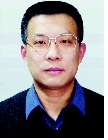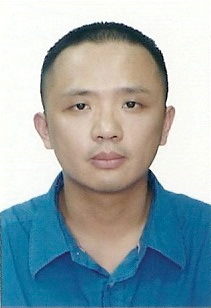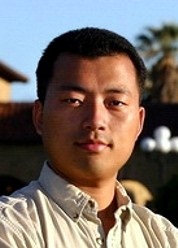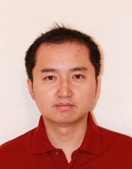| Greetings: Zhong Fang & Xi Dai are the Joint Winners of the 2012 AAA Award, and Yulin Chen & Xuan Gao are the Co-Cinners of the 2012 OYRA Award |
Professors Zhong Fang and Xi Dai from the Institute of Physics, Chinese Academy of Sciences, are the joint winners of the 2012 Achievement in Asia Award (AAA) (Robert T. Poe Prize), and Dr. Yulin Chen (Department of Physics, the University of Oxford) and Professor Xuan Gao (Department of Physics, Case Western Reserve University) are the co-winners of the 2012 Outstanding Young Researcher Award (Macronix Prize) of the International Organization of Chinese Physicists and Astronomers (OCPA). The OCPA AAA is given annually to Chinese physicists/astronomers or a team working in Asia in recognition of their outstanding achievements in physics and astronomy. The OYRA Award (Macronix Prize) is given each year to a young ethnic Chinese physicist/astronomer outside of Asia in recognition of his/her outstanding achievements in physics/astronomy.


Professors Zhong Fang and Xi Dai have both received their Ph.D. degrees in Mainland China, namely from Huazhong University of Science and Technology, and the Institute of Theoretical Physics, CAS, respectively. After their doctoral studies, Professor Fang continued his research in Japan and made important and original contributions in anomalous Hall Effect together with N. Nagaosa et al. Professor Dai was in the US and Hong Kong for several years, and his paper with G. Kotliar on first principle calculations by using dynamic mean field theory is highly influential. Professor Fang returned to China in 2003 and founded the group of computational physics in Institute of Physics. Professor Dai joined him in 2006.
Profs. Fang and Dai's research field is the electronic structure calculations for correlated materials and exotic quantum phases. Their collaboration has led to a number of distinguished contributions to frontier topics in condensed matter physics, and topological insulators in particular, by combining first principal calculations and spin-orbit physics. They predicted the spin density wave instability in the parent compound of iron based superconductors, providing a clear evidence for the interplay between the superconductivity and anti-ferromagnetism. They discovered the salient topological nature of Bi2Se3, Bi2Te3, and Sb2Te3 family compounds, a class of 3-dimensional strong topological insulators, which greatly stimulated worldwide activities in the field. They further predicted that quantum Hall effect without external magnetic field (called the quantized anomalous Hall Effect) could be realized in magnetically-doped topological insulators. In addition, they have developed the highly efficient LDA+Gutzwiller method for the fully self-consistent calculations of correlated electron systems. Their contributions have been recognized by receiving the prestigious Qiu-Shi Group Outstanding Achievement Prize in Science and Technology in China, and the Outstanding Science and Technology Achievement Prize of CAS in 2011. Prof. Fang was awarded the ICTP Prize (Adbus Salam International Center for Theoretical Physics, Italy) in 2008, and became an APS fellow in 2011.

Dr. Chen received his B.S. degree in Physics from the University of Science & Technology of China in 2000 and Ph.D. degree in Physics from Stanford University in 2008. Since then, he spent one year as a postdoctoral scholar (2008-2009), and then two years as associate staff Scientist (2009-2010) and staff scientist (2010-2011) at SLAC National Lab. He joined the University of Oxford in 2012 as a University Lecturer (Physics Department) and Fellow of Jesus College.
Dr. Chen's research interest lies in the area of experimental condensed matter physics; and specifically, in understanding the behavior of electrons in unconventional materials, such as topological quantum matters and strongly correlated systems. He is also interested in developing advanced instrumentation to explore critical information on condensed matter systems with new degrees of freedom. His doctoral thesis was based on both scientific projects and instrumentation developments. For the former, he worked on cuprate high transition temperature superconductors (HTSC) and his discovery of a novel self-doping high Tc superconductor (Ba2Ca3Cu4O8F2) with many surprising and unconventional electronic properties posed important implication on current HTSC theories. For the latter, he developed various experimental instruments, including a laser based spin- and time-resolved photoemission spectrometer. Recently, he extended his research into new fields of topological quantum materials. He successfully realized one of the first single Dirac cone 3D topological insulators (Bi2Te3) and the insulating massive Dirac fermion states (in magnetically doped Bi2Te3), providing the materials base for the realization of many unique topological properties., He also explored, with collaborators, the properties of low dimensional topological insulators (including nano-wires, nano-ribbons/plates and thin films), and demonstrated the Aharonov-Bohm effect, ambipolar gating and unusual optical transparency (while maintaining excellent electrical conductivity), which not only enriched the fundamental research of topological quantum materials, but also opened the door to their applications.

Professor Xuan Gao was born in JiangXi province, China in 1978. He received his B.S. degree in Applied Physics at South China University of Technology in 1998. In 2003, he received his Ph.D. degree at Columbia University under the supervisions of Prof. Aron Pinczuk (at Columbia) and Drs. Allen Mills and Arthur Ramirez (at Bell Labs). His Ph.D. thesis was awarded the Robert Simon Memorial Prize by the Department of Applied Physics and Applied Math of Columbia University. Between 2003 and 2005, he was a Director's Funded postdoctoral fellow at Los Alamos National Lab under the supervision of Dr. Greg Boebinger. Then he moved to Harvard University to extend his postdoctoral training in Prof. Charles Lieber's group. In 2007, he joined Case Western Reserve University as an Assistant Professor in Physics.
Prof. Gao's research interests include emergent phases and phase transitions in low dimensional correlated electron systems, and the synthesis, understanding and engineering of functional nanomaterials/devices. In the field of strongly correlated two-dimensional (2D) electrons, he has made important contributions to the understanding of an emergent 2D metallic state and the metal-insulator transition (MIT). For example, his research group (and collaborators) recently elucidated the 2D MIT in ultra clean gallium arsenide quantum wells with extreme interaction strength as being an electron liquid to solid phase transition. In addition, Prof. Gao has also made broad contributions to revealing the physics of nanowire materials and their device applications. Examples of recent work from his lab include quantum transport studies of electrons in semiconductor nanowires, discovery of a linear magneto-resistance in topological insulator nanowires, and the elucidation of performance limits of nanowire based bio-sensors.
For more details, please see http://www.ocpaweb.org/new/